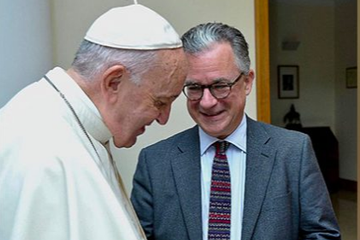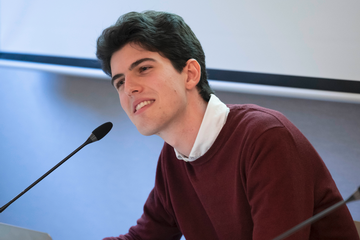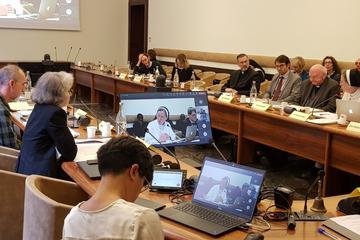
By Laura Ieraci
CHICAGO — Lay people have a key role to play in helping the Church respond to the twin crises it is currently experiencing: the sexual abuse of minors and vulnerable adults and the distrust of Church leadership, said lay leader Kerry Robinson.
The global ambassador for the nonprofit Leadership Roundtable has been dedicated to inspiring and shaping cultural, spiritual and organizational renewal in the Church, aimed at bringing about healing and reconciliation, since she first learned about the incidence of sex abuse in the Church in 1994.
Since then, and especially after the sex abuse scandal broke in the Archdiocese of Boston in 2002, Robinson said she has believed that laypeople have “a moral obligation to be part of the solution and to effect healing and reconciliation.”
“So long as we are part of this Church, to do nothing (about the sex abuse crisis) is to be complicit,” she said.
In 2003, she and Father Robert Beloin collaborated at Yale University to expand Catholic life and elevate Catholic intellectual discourse on campus. They also organized the three-day “Governance, Accountability and the Future of the Catholic Church” conference that examined the underlying conditions of the crisis and called for greater justice and transparency.
Inasmuch as the abuse crisis is devastating for survivors and the Catholic faithful, it can also be a “catalyst for positive managerial reform that could bring modern practices to the life of the Church,” Robinson said.
This sober yet hopeful approach to the abuse crisis was implemented through Leadership Roundtable, a nonprofit organization founded in 2005. In view of greater transparency and accountability, Robinson has met with bishops across the country to help implement best practices in management and leadership, promoting the inclusion of competent laity in these areas.
However, the recent allegations of abuse against Archbishop Theodore McCarrick in June and the Pennsylvania Grand Jury Report in August launched “a new wave of collective heartbreak and outrage” among Catholics and the general public, she said.
Part of the outrage was “the acute awareness that the bishops have not been held accountable for their sins of omission and commission in protecting children,” she said.
This new awareness and sense of outrage, fuelled by the #MeToo Movement, further illustrated the depth of the “twin crises” and the conviction that “solving one without the other is folly,” she said.
In response, Leadership Roundtable convened a meeting of bishops, survivors, canon lawyers, lay executives and other lay leaders in Minneapolis this fall that concluded by drafting an “Architecture for Action” — a document intended for the U.S. Conference of Catholic Bishops with recommendations for action.
“It is a clarion call to put survivors of abuse at the centre of deliberations, care and pastoral action,” she said.
The document also underlines the need to reform seminary formation and the process of selecting bishops, to emphasize ongoing formation for priests and to involve the laity in co-responsibility for the Church, which includes involving them in leadership and decision-making.
Robinson maintains that solutions are being put forward in a serious, thoughtful and organic way by Leadership Roundtable, which is a growing “network of networks” comprised of highly competent and engaged ordained, religious and lay leaders.
“Our work is not to humiliate, shame or embarrass Church leaders,” she said. “Rather, the Church deserves to be managed with the highest standards of care, compassion, ethics and justice because its mission is that much more important than that of a corporation.”
“We need laity to be part of this solution,” said Robinson. For this to happen, “we need structures to include laity.”
“We have a system that has not fully availed itself of the competent lay men and women to strengthen the life of the Church,” she said, urging the creation of structures and models that include the ordained, religious and the laity.
“We make better decisions when we have more perspectives,” she said. “Diversity really does matter.”
According to Robinson, every Catholic has a stake in the state of the Church at this point in time.
“We’re at a threshold. There is a mounting impatience among the laity, calling for action. It is a crucial and urgent moment for all of us,” she said.
“I can’t blame those who leave, but I am inspired by those who stay,” she continued. “We are a Paschal people and we believe out of suffering and death comes new life. All of us can bear witness to the new life that is to be born of this.”
Every Catholic, even those in the pew, can do something to help bring about healing and renewal, including praying for survivors, shifting Church culture away from clericalism toward transparency and accountability, encouraging pastors to preach about the crisis and the need for renewal, and holding parish meetings to speak about the crisis and moving forward, she suggested.
“We’re called to do all things in love,” she said. “We’re all in this together.”


